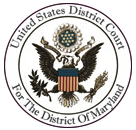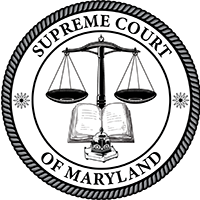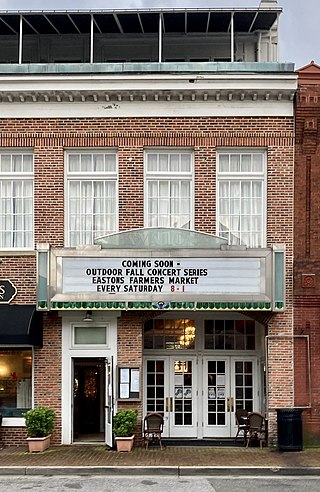
The United States District Court for the District of Maryland is the federal district court whose jurisdiction is the state of Maryland. Appeals from the District of Maryland are taken to the United States Court of Appeals for the Fourth Circuit.

The Supreme Court of Maryland is the highest court of the U.S. state of Maryland. The court, which is composed of one chief justice and six associate justices, meets in the Robert C. Murphy Courts of Appeal Building in the state capital, Annapolis. The term of the Court begins the second Monday of September. The Court is unique among American courts in that the justices wear red robes.

The Avalon Theatre is a historic theater located in downtown Easton, Maryland. Originally built as a cinema in 1921, The Avalon was billed as the "Showplace of the Eastern Shore." Today serves as the prime venue of the Mid-Shore area for performing arts, nationally and locally.

Maryland's 1st congressional district encompasses the entire Eastern Shore of Maryland, including Salisbury, as well as Harford County and parts of Baltimore County; it is the largest congressional district in the state geographically, covering 11 counties.

Maryland's 5th congressional district comprises all of Charles, St. Mary's, and Calvert counties, as well as portions of Prince George's and Anne Arundel counties. The district is currently represented by Democrat Steny Hoyer, who from 2007 to 2011 and from 2019 to 2023 was House Majority Leader.
Carole Highlands is an unincorporated community in Prince George's County, Maryland, United States. It is contained between East West Highway to the south, University Boulevard to the north, Larch Avenue, Hopewell Avenue, and 15th Avenue to the west, and Riggs Road to the east. Carole Highlands borders the adjacent neighborhoods of Chillum, Green Meadows, Lewisdale, and Langley Park in Prince George's County, while bordering the city of Takoma Park in Montgomery County. For statistical purposes, it is part of the Langley Park census-designated place (CDP). The community also has a community association and non-profit: Carole Highlands Neighborhood Association

Northeast Boundary is small neighborhood located in the northeast quadrant of Washington, D.C., in the United States. Along with the Capitol View neighborhood, it is the easternmost neighborhood of the District of Columbia.

Maryland's Legislative District 31 is one of 47 districts in the state for the Maryland General Assembly. It covers part of Anne Arundel County. Up until the 2020 United States redistricting cycle, the district was divided into two sub-districts for the Maryland House of Delegates: District 31A and District 31B.
Lyons Creek is an 11.2-mile-long (18.0 km) tributary of the Patuxent River in Maryland. Lyons Creek serves as the border between southern Anne Arundel County, Maryland and northern Calvert County, Maryland.
The Baltimore City District Courthouses of the District Court of Maryland are located at North Avenue, Wabash Avenue, Patapsco Avenue and E. Fayette Street in Baltimore, Maryland, and serve as the courts of first impression for the majority of residents in Baltimore City.
Bushwood is an unincorporated community in what is familiarly called the "Seventh District" of St. Mary's County, Maryland, United States. Ocean Hall was listed on the National Register of Historic Places in 1973. The ZIP Code for Bushwood is 20618.

Coltons Point is an unincorporated community in what is popularly called the "Seventh District" of St. Mary's County, Maryland, United States. A small historical museum and a lighthouse are located there. Seasonal boat service carry visitors the short distance to the shrinking, uninhabited St. Clement's Island, where in 1634 the first European settlers arriving in Maryland landed and celebrated the first Catholic Mass in English-speaking North America. It was listed on the National Register of Historic Places in 1972. The ZIP Code for Coltons Point is 20626.
Compton is an unincorporated community near Leonardtown in St. Mary's County, Maryland, United States. The St. Francis Xavier Church and Newtown Manor House Historic District were listed on the National Register of Historic Places in 1972. The ZIP Code for Compton is 20627.

Avenue is an unincorporated community in what is familiarly called the "Seventh District" of St. Mary's County, Maryland, United States.
Chimney Run is an unincorporated community in Bath County, Virginia, in the United States.
Robert N. McDonald is a former judge of the Maryland Court of Appeals. He was appointed to the Court by Governor Martin O'Malley in 2012.
The Patuxent Iron Works was an ironworks along the Patuxent River in Maryland, United States.
Collington Branch is a stream that flows into the Western Branch of the Patuxent River in Prince George's County, Maryland.
Eames is an unincorporated community in Skelton Township, Warrick County, in the U.S. state of Indiana.
The North River is a tributary of the South River in Maryland.












